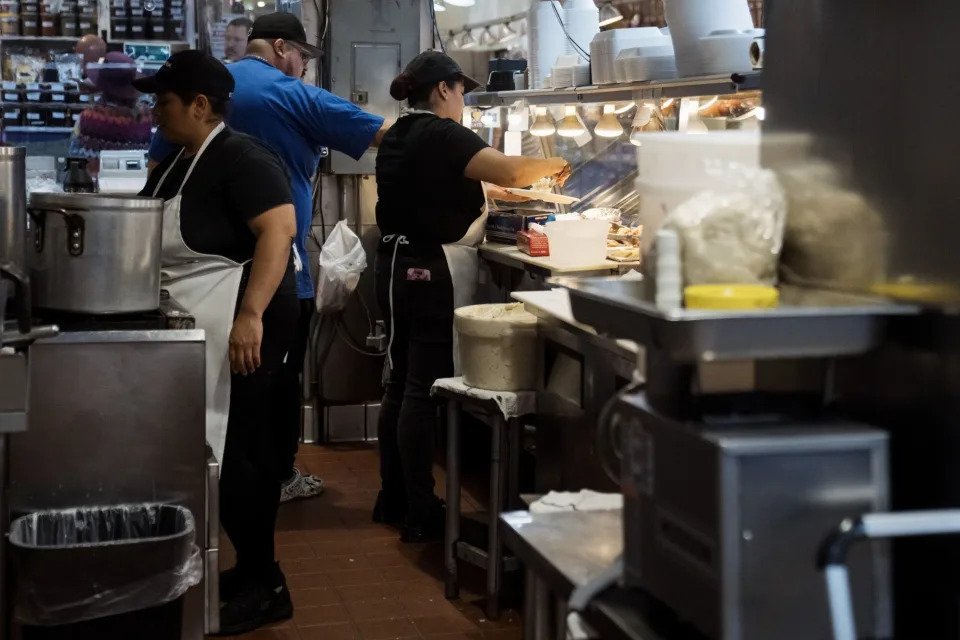


Eliyahu Kamisher, Josh Eidelson and Andrew Oxford
Wed, Jun 12, 2024,
(Bloomberg) -- For two decades, a California law has helped workers sue the world’s biggest companies. Drivers for Uber Technologies Inc. won a $20 million settlement, Google employees secured $27 million over complaints of free-speech violations, and Walmart Inc. agreed to pay $65 million for allegedly not providing seating to their cashiers.
Now, Governor Gavin Newsom is quietly overseeing talks about changing that law after prodding from some of California’s largest business interests, who say a cascade of progressive policy wins in the state – like raising the minimum wage for fast-food workers to $20 an hour and increasing paid sick days — are eating away at their bottom lines.
Newsom’s office has brought together the state’s powerful California Chamber of Commerce with the California Labor Federation to hash out a compromise over the Private Attorneys General Act, or PAGA, people familiar with the negotiations said. The law has cost big and small businesses $10 billion over the past ten years, according to one study, and is viewed by labor advocates as a model of worker protection.
The negotiators are in a race against time: June 27 is the deadline to strike a measure from Californians’ November ballot that would give voters the opportunity to repeal the law. The Chamber of Commerce is negotiating on behalf of a broad alliance, which includes the billionaire owner of the Wonderful Company, Stewart Resnick, car dealership owners, Walmart and McDonald’s Corp., along with small businesses across the state. The business coalition committed more than $31 million to entities backing the ballot measure, including the signature-gathering effort and an advertising blitz.
Seeking Compromise
Yet both sides would rather strike a compromise, according to people familiar with the negotiations, in order to forgo the massive expense of a ballot fight. The governor is also eager to get PAGA off the ballot, according to a person familiar with his thinking, to keep focus on a separate ballot measure that he opposes which would require voter approval for new taxes.
Newsom, who started his career running a hospitality group, has often sought to appease the business leaders who are perennially frustrated by policies enacted by the state’s liberal lawmakers.
PAGA “is a California-only issue that businesses in California are subjected to, and it adds a huge layer of costs for them,” said Jennifer Barrera, president of the California Chamber of Commerce.
Outlines of a possible deal remain vague, with the business coalition saying it wants to bolster state enforcement and reduce avenues for civil litigation. Labor leaders are willing to reform aspects of PAGA in ways that would lead to fewer lawsuits based on minor violations of state labor code. But they insist that workers retain the ability to use PAGA claims to get around forced arbitration, according to people familiar with the negotiations.
“We’re willing to work on reforms that do two things,” said Lorena Gonzalez, head of the California Labor Federation, a coalition of unions. “One: change the working conditions that are illegal. Two: make the worker whole.”
The push to overhaul PAGA is an effort by business interests in California to fight back against a series of major wins the state’s progressive leaders have notched. Last year, after hundreds of thousands of workers went on strike around the state, lawmakers approved a hike in the minimum wage for health-care workers to $25 an hour. In October, Newsom approved sweeping climate change legislation forcing companies to disclose carbon emissions across their entire supply chain.
The governor’s office took notice of the PAGA reform effort last year during talks that led to a $20 minimum wage deal for California fast-food workers. Franchisees requested that Newsom pair the wage hike with a PAGA deal to offset new costs, according to a person familiar with the negotiations. While PAGA wasn’t addressed, the governor’s staff said they would try to tackle PAGA in a future compromise.
The business groups’ playbook is a familiar one in California politics. Companies often look to sidestep the legislature by funding a ballot measure that would take their issue directly to voters. They then use the prospect of a costly ballot fight to force negotiations overseen by the governor’s office. If an agreement is reached, the legislature approves the compromise with the governor’s blessing, and all sides avoid spending tens of millions of dollars trying to drum up support or opposition.
“There’s an opportunity of course, just like with any other ballot measure that qualifies, for the legislature to step in and fix PAGA,” said Brian Maas, president of the California New Car Dealers Association. “We’ve got $20 million in our bank account and we’re prepared to push the measure forward.”
PAGA passed the California legislature in 2003. The law is unique in that it allows employees to act as “private attorneys general,” bringing lawsuits on behalf of the government for workplace violations.
The parts that especially exasperate businesses are the ability for workers to file suits on behalf of their colleagues and duck forced arbitration clauses. As forced arbitration clauses become increasingly common, workers are turning to PAGA more than ever. In 2022, the number of PAGA settlements topped 3,165, an 1,100% increase from 2016, according to a study funded by the California Chamber of Commerce.
“We had signed our rights away” by agreeing to forced arbitration, said Melissa Viviana Covarrubias, a janitorial worker in San Diego who’s accusing her company of illegally misclassifying employees as independent contractors and depriving them of minimum wage, overtime and rest breaks. PAGA “allowed us to sue on behalf of the state. It’s pretty awesome to be able to do that.”
Cottage Industry
PAGA settlements are divided between the state, workers and their lawyers. The law’s success – built on a cottage industry of attorneys that specialize in PAGA claims – nabbed the state more than $200 million in civil penalties in the 2022-2023 fiscal year. In New York, a PAGA-like bill has been introduced every session since 2017.
Unions worry wage theft will go unpunished if PAGA is repealed. Workers can file claims seeking unpaid wages with the state labor commissioner, but a recent investigation found that office took a median of 854 days to issue decisions. The delay contributed to a backlog of 47,000 unprocessed claims by the middle of last year, according to the state auditor.
Weakening PAGA would force even more workers to rely on that chronically underfunded agency, opponents of its repeal argue.
“PAGA is the only way most workers can escape arbitration agreements specifically designed to silence them,” said Lea-Ann Tratten, political director for Consumer Attorneys of California. “Without PAGA, workers have nowhere else to turn.”
Opponents of PAGA’s current structure say the law largely benefits lawyers who file lawsuits for technical violations of the state’s sprawling labor code like spelling errors. They point to cases where attorneys reap payouts that are larger than what the workers get. The business coalition says instead of lawsuits, the state should bolster enforcement of the labor code and raise penalties for certain violations to deter bad actors.
“It’s insulting that attorneys get the majority of the fees,” said Heath Flora, the top Republican on the Assembly Labor and Employment Committee.
--With assistance from Daniela Sirtori.
Bloomberg Businessweek
No comments:
Post a Comment